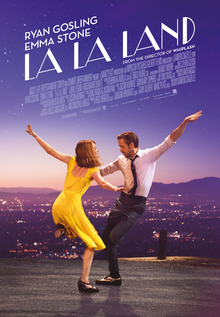La La Land: values and choices
A musical extravaganza that will cause us to think about what we value and worship as we make choices in our own lives. By Nick Pollard
 ‘That’s L.A. They worship everything and value nothing.’ So says Sebastian (Ryan Gosling) as he walks through the Warner Brothers’ back lot with Mia (Emma Stone) in the award-winning new film La La Land. These two star-crossed lovers, drawn together by their shared failures, develop a beautiful and beautifying relationship as they share their distinctive dreams for the future. He seeks to restore the popularity of jazz in a world of soulless commercial music. She seeks to restore the creative role of the actress in a world of formulaic soap operas.
‘That’s L.A. They worship everything and value nothing.’ So says Sebastian (Ryan Gosling) as he walks through the Warner Brothers’ back lot with Mia (Emma Stone) in the award-winning new film La La Land. These two star-crossed lovers, drawn together by their shared failures, develop a beautiful and beautifying relationship as they share their distinctive dreams for the future. He seeks to restore the popularity of jazz in a world of soulless commercial music. She seeks to restore the creative role of the actress in a world of formulaic soap operas.
But what values will drive them as they make choices in pursuit of their dreams? And what impact will this have on their lives?
The Times described this film as an ‘intravenous shot of joy in the January darkness.’ And it certainly is that. But it is also more than that. In one key scene Sebastian shows Mia how jazz musicians are spontaneous, with individual instruments suddenly taking the lead and driving the music in a different direction. In the same way, the film illustrates how life is messy as new opportunities take us in unexpected directions. But what are the core values that underpin the choices we make, and affect what we worship?
It’s 50 years since Marshall McLuhan famously said ‘the medium is the message’, and this is certainly evident in this film as its message is conveyed through its particular use of the musical genre, where even its structure breaks the standard mould of formulaic movies.
Most films, and indeed many other forms of storytelling, use a three-act story arc. The first act, variously called the ‘setup’ or ‘exposition’, introduces the characters and their context, with sufficient back-story to cause the viewer to care about their lives. It leads to an ‘inciting incident’ – a dramatic turning point that raises a seemingly insurmountable problem.
Then follows the second act, variously called ‘confrontation’ or ‘rising action’, in which the characters seek to overcome the problem, but the tension builds as their efforts simply make the problems worse. Finally, in the third act, usually called ‘resolution’, the characters eventually overcome the problems, with a dramatic and emotional climax.
But La La Land has five parts, each explicitly signalled by a title on the screen (winter, spring, summer, fall, winter). What could have become a dramatic, climactic, resolution at the end of the third act (summer) turns out only to be a staging post in the story as it heads on into fall and winter.
And that is what life is like. It doesn’t resolve simply and easily. We continue to face new and different challenges. The formulaic three-act story arc is as fictional as the tales it is used to describe. Take the classic film Pretty Woman for example, which resolves in the climax of the city financier (Richard Gere) driving off happily with the prostitute (Julia Roberts). What would have happened if the story had continued with two more acts? Possibly relationship breakdown and bitter recriminations?
So, in a bizarre way, La La Land is actually more realistic in its story arc, despite its use of the fantastical impossibilities of the musical genre (if you suddenly start singing and dancing in a traffic queue in the real world people don’t join in, knowing all the words and the steps!) And for that reason it is more evocative, as it causes us to think about the values that underpin our choices.
The film leaves us wondering what could have been different in Sebastian and Mia’s lives if they had made different choices. And the ending is deliberately enigmatic. In the final musical number, whose dream are we watching? Is it Sebastian’s or Mia’s?
Or is it possibly the viewer’s dream? We expect, even unconsciously demand, a climactic resolution. Why is that? Is it because there will indeed be a final resolution for all of creation, in which relationships are restored and we all get to sing and dance together? And, if God has planned that from the foundation of the world, has he put that desire deep in our hearts, so we have a deep yearning for such a resolution?
Whatever your perspective on life and love, La La Land is a bright and colourful musical extravaganza that will cause you to think about what we value and what we worship as we make choices in our own lives.
Nick Pollard is co-founder of EthosEducation.org which publishes free educational resources to help people develop a greater understanding of themselves, their community and the world around them, and to explore the Bible’s teaching about contemporary issues.
This review was first published on EthosFilmBlog.org and is used with permission

Baptist Times, 19/01/2017